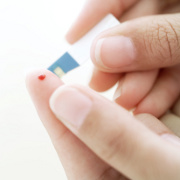 Photo: Getty Images
Photo: Getty Images
Type 2 diabetes starts with insulin resistance in tissues that normally use insulin to facilitate the uptake of glucose from the blood. The American Diabetes Association (ADA) defines prediabetes as a condition with fasting blood glucose between 100 and 125 mg/dl. Values higher than this are characteristic of diabetes, while lower values are normal. Prediabetes is also called impaired glucose tolerance or impaired fasting glucose.
Dr. Tadashi Moriuchi and colleagues at Kanazawa University Graduate School of Medical Science, Japan, performed a study on progression from high blood glucose to diabetes.
As background information, Moriuchi noted that the ADA changed the lower limit of impaired fasting glucose from 110 to 100 mg/dl in 2003. The goal of the study was to investigate the risk for subjects with high blood glucose to develop diabetes. The subjects were 4,165 school teachers who were non-diabetic at baseline. The average (mean) follow-up time was 5.1 years. Moriuchi and colleagues found the following rates for development of diabetes, depending on initial blood glucose levels:
1. Normal blood glucose, less than 100 mg/dl, 0.5 percent.
2. Blood glucose 100 to 109 mg/dl, 6.5 percent.
3. Blood glucose 100 to 125 mg/dl, 28.2 percent.
Once the fasting blood glucose levels reach the diabetic level of 126 mg/dl or higher, the beta cells of the pancreas are at risk for damage. Dr. Hideaki Kaneto and colleagues at Osaka University, Japan, provided a review of the progression from early type 2 diabetes to insulin dependence.
The process of beta cell glucose toxicity decreases insulin secretion and causes apoptosis of the pancreatic beta cells. Reactive oxygen species are also induced under diabetic conditions, and Kaneto concluded that these may be involved in the progression of both insulin resistance and beta cell dysfunction.
“Although at present several clinical trials with antioxidants show only a little effect, if any, on the progression of type 2 diabetes, we think that future therapy with stronger and more appropriate antioxidants would exert some beneficial effects,” Kaneto reported.
Dr. Stanley S. Schwartz of the University of Pennsylvania also reported on the progression of type 2 diabetes. He recommended early and aggressive treatment to keep blood glucose in the target range.
References:
1. American Diabetes Association information online:
http://www.diabetes.org/diabetes-basics/prevention/pre-diabetes/pre-diabetes-faqs.html
2. Moriuchi T et al, “Diabetes progression from “high-normal” glucose in school teachers”, Internal Medicine 2010; 49: 1271-76. http://www.ncbi.nlm.nih.gov/pubmed/20606358
3. Kaneto H et al, “Role of reactive oxygen species in the progression of type 2 diabetes and atherosclerosis”, Mediators of Inflammation 2010; 2010: 453892. http://www.ncbi.nlm.nih.gov/pubmed/20182627
4. Schwartz SS et al, “Glycemic control and weight reduction without causing hypoglycemia: The case for continued safe aggressive care of patients with type 2 diabetes mellitus and avoidance of therapeutic inertia”, Mayo Clinic Proceedings 2010 December; 85(12): S15-S26. http://www.ncbi.nlm.nih.gov/pubmed/21106867
Reviewed July 26, 2011
by Michele Blacksberg R.N.
Edited by Shannon Koehle
Linda Fugate is a scientist and writer in Austin, Texas. She has a Ph.D. in Physics and an M.S. in Macromolecular Science and Engineering. Her background includes academic and industrial research in materials science. She currently writes song lyrics and health articles.





Add a Comment1 Comments
The Anti Obesity drug makers and diabetes drug makers take in 10 billion$$$$ every year with no cure!!
Food Chemicals are the cause of the diabetes and obesity crisis
The FDA and Drug makers know this and are laughing to the Billionaire$$$ bank
The food chemicals break the gut(insulin) and this is the cause of the diabetes and obesity crisis
A filmmaker has been reversing diabetes and Obesity WITHOUT MEDICATIONS in now 10 countries and the drug makers do not promote the story SEE HERE http://spirithappy.org/wp/?page_id=788
July 26, 2011 - 7:36amThis Comment